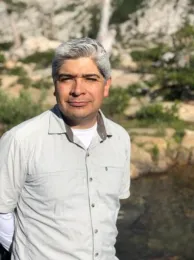
Solis considers himself a “water accountant” given his expertise in water availability, both naturally and man-made, and water use. When he's not working as a water accountant, Solis is teaching an undergraduate course called Water Science and Management, and a graduate level course called Water Resources Planning and Management.
Solis earned a Ph.D. in civil engineering from the University of Texas at Austin and a master's degree in hydraulics and a bachelor's degree in civil engineering from Instituto Politécnico Nacional in Mexico City, Mexico.
When asked to reflect on the 11 years he has spent with UC ANR, here's what Solis had to say:
What do you enjoy most about your role?
Making a difference in people's life. I like that I can talk with people and help them out whether it's designing a water supply system for a homeowner who lost their home in a fire or advising decision makers in Sacramento on how much water is needed to sustain healthy rivers throughout the state of California.
How has your culture influenced your work ethic?
I'm a people's person! My culture helped me connect with people at the personal level in addition to the professional level.
What legacy or impact do you want to have on black and brown communities who see someone like you in this career?
There are about 800,000 people in California without access to clean, safe and affordable water and I'd really like to reduce this number. Some communities are drinking water with fertilizer, pesticides, and/or arsenic in it, and I feel bad because many of the people affected are Hispanic migrant workers that often cannot demand their human right to water—a California bill that was passed in 2012.
We are the only state in the United States with this duty and must still deliver it. It's heart breaking because the people that do not have access to water look like me, like my mom and dad, like my nieces. It's a very difficult situation as a person, but as a scientist, I am putting all my energy into shedding light onto this problem.
Which achievement are you most proud of and why?
Well, many. The first would be a water conservation program that I estimated and was passed in 2012 in Pajaro Valley. I also led a research group that estimated environmental flows or how much water river's need to maintain good conditions for every river in the state of California. I have helped irrigation districts optimize their water use too.
Currently, I am working a program that trains people to provide professional services focused on helping every farmer in the state improve their irrigation and nitrogen practices, reduce contamination and save water.
How has UC ANR contributed to your personal or professional growth?
The Cooperative Extension system is awesome! It has strengthened my ability to solve problems. I believe this collaborative system and the passion from all my colleagues is what keeps the Cooperative Extension system moving for the last 100 years.

